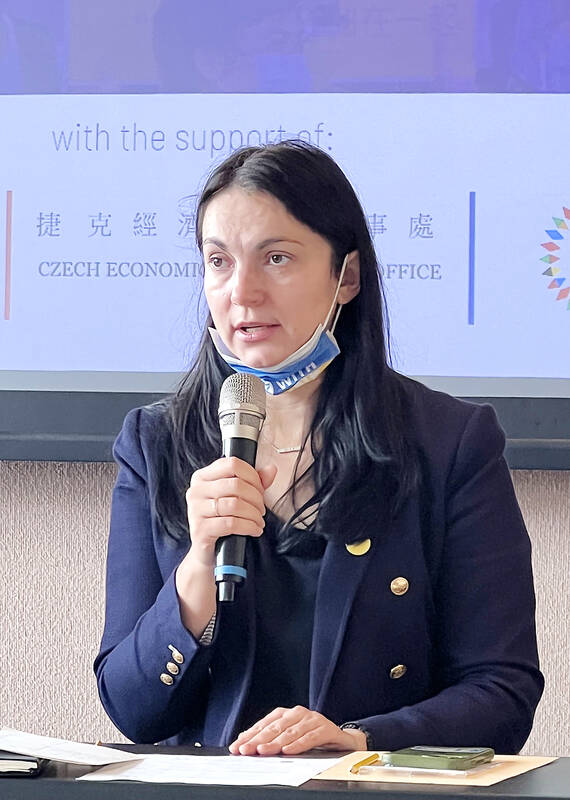Taiwanese should learn from what happened to Ukraine and never accept any peaceful settlements proposed by China, former Ukrainian lawmaker Hanna Hopko told a security conference in Taipei on Friday.
Hopko was addressing the Taiwan-Czechia-Ukraine Forum hosted by Prague-headquartered think tank European Values Center for Security Policy (EVC).
She said that since Russia in 2014 annexed Crimea, a Ukrainian peninsula on the northern coast of the Black Sea, Ukrainians have heard a great deal about how their country should make “a peaceful settlement” or find “political, diplomatic solutions” with Russia.

Photo: CNA
Hopko, who is chairwoman of the Ukrainian Anti-Corruption Action Center, said her country has come “under pressure” from its Western partners to make peace with Russia.
“The result of such an approach is genocide,” Hopko said, urging Taiwan to “learn the lesson” of Ukraine and “never trust or believe your neighbor with expansionist ambitions.”
Taiwanese should keep in mind what she called “hybrid methods” utilized by the likes of Russia and China, she said.
The Russian operatives have bribed Ukrainian politicians, infiltrated Ukrainian institutions and invested heavily in propaganda within Ukraine for decades, with the aim of expanding Russian influence while dividing Ukrainian society, she said.
Hopko said democracies around the world should abandon a long-standing policy of “strategic ambiguity” toward Taiwan and instead adopt “strategic clarity” so as not to repeat the tragedy of Ukraine in Taiwan.
The US over the past few decades has maintained a stance characterized as “strategic ambiguity,” under which Washington remains vague about whether it would defend Taiwan in the event of an attack by China.
Hopko also said that Western powers opposing the invasion of Ukraine should make “decisive actions” to stop the war and help Ukraine win its fight instead of hesitate in the wake of nuclear threats.
If Western countries allow Russia to “blackmail the whole world with the use of nuclear power,” it would give China the impression that it could do the same to prevent intervention by the international community if it attacks Taiwan.
Taiwan should try to convince the US to abandon strategic ambiguity, as it could be regarded by China as a “weakness,” Lithuanian lawmaker Zygimantas Pavilionis said.
“You have to be very clear about what is the red line that [your enemies] cannot even think to cross,” said Pavilionis, deputy chair of the Committee on European Affairs in the Lithuanian parliament.
Taiwan should continue to arm itself, as eventually Taiwanese would be the ones defending their country should China launch an invasion, he said.
Pavilionis also urged Taiwan to reduce its trade dependence on China, saying that it is “a suicide mission” if the county continues to “put all the money in China’s pockets.”
Last year, 42 percent of Taiwan’s exports went to China, and 22 percent of Taiwanese imports came from the country, Bureau of Foreign Trade data showed.
EVC director Jakub Janda said that Friday’s conference was part of efforts by the think tank to foster exchanges between Taiwan and European nations on defense and security policies.
The think tank, which established an office in Taipei in January, aims to facilitate political ties between Taiwan and the Czech Republic, Janda said, adding Czech Chamber of Deputies Speaker Marketa Pekarova Adamova is planning to lead a delegation to Taiwan next spring.

ENTERTAINERS IN CHINA: Taiwanese generally back the government being firm on infiltration and ‘united front’ work,’ the Asia-Pacific Elite Interchange Association said Most people support the government probing Taiwanese entertainers for allegedly “amplifying” the Chinese Communist Party’s propaganda, a survey conducted by the Asia-Pacific Elite Interchange Association showed on Friday. Public support stood at 56.4 percent for action by the Mainland Affairs Council and the Ministry of Culture to enhance scrutiny on Taiwanese performers and artists who have developed careers in China while allegedly adhering to the narrative of Beijing’s propaganda that denigrates or harms Taiwanese sovereignty, the poll showed. Thirty-three percent did not support the action, it showed. The poll showed that 51.5 percent of respondents supported the government’s investigation into Taiwanese who have

South Korean K-pop girl group Blackpink are to make Kaohsiung the first stop on their Asia tour when they perform at Kaohsiung National Stadium on Oct. 18 and 19, the event organizer said yesterday. The upcoming performances will also make Blackpink the first girl group ever to perform twice at the stadium. It will be the group’s third visit to Taiwan to stage a concert. The last time Blackpink held a concert in the city was in March 2023. Their first concert in Taiwan was on March 3, 2019, at NTSU Arena (Linkou Arena). The group’s 2022-2023 “Born Pink” tour set a

A Philippine official has denied allegations of mistreatment of crew members during Philippine authorities’ boarding of a Taiwanese fishing vessel on Monday. Philippine Bureau of Fisheries and Aquatic Resources (BFAR) spokesman Nazario Briguera on Friday said that BFAR law enforcement officers “observed the proper boarding protocols” when they boarded the Taiwanese vessel Sheng Yu Feng (昇漁豐號) and towed it to Basco Port in the Philippines. Briguera’s comments came a day after the Taiwanese captain of the Sheng Yu Feng, Chen Tsung-tun (陳宗頓), held a news conference in Pingtung County and accused the Philippine authorities of mistreatment during the boarding of

88.2 PERCENT INCREASE: The variants driving the current outbreak are not causing more severe symptoms, but are ‘more contagious’ than previous variants, an expert said Number of COVID-19 cases in the nation is surging, with the Centers for Disease Control (CDC) describing the ongoing wave of infections as “rapid and intense,” and projecting that the outbreak would continue through the end of July. A total of 19,097 outpatient and emergency visits related to COVID-19 were reported from May 11 to Saturday last week, an 88.2 percent increase from the previous week’s 10,149 visits, CDC data showed. The nearly 90 percent surge in case numbers also marks the sixth consecutive weekly increase, although the total remains below the 23,778 recorded during the same period last year,